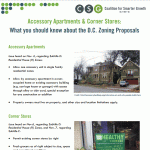More than a decade after the Brookings Institution released the seminal Region Divided report, the Washington region is still divided, with parts of D.C. and the east side of the region not sharing in the prosperity of our economy.
Despite some progress in the last decade, many eastern communities continue to fall on the wrong side of the regional divide with slow job growth, poorly performing schools, high crime, and a devastating home foreclosure crisis. Meanwhile, even in wealthier communities throughout the region many families struggle to keep up with rising housing costs, a situation made even worse by the a lack of diversity in housing types and transit-oriented development.
Addressing this challenge is the most important mission of CSG. With our focus integrating the interconnected issues of land use, housing, and transportation, we are uniquely situated to address this divide through changes in infrastructure policies and our work in local communities across the region. Providing more housing options close to jobs in job-rich areas, creating incentives for jobs to be focused at underdeveloped Metro stations on the east side of the region, focusing businesses in transit-accessible locations, and linking affordable housing and transit, are among the key solutions.
Latest Happenings
Testimony to the Committee on Economic Development and Housing on DHCD and DMPED Performance Oversight

McDuffie Bill Would Require Affordable Housing in Public-Land Development
Testimony to DC Council Committee on Finance and Revenue: Support for the Truth in Affordability Reporting Act of 2013

Accessory Apartments & Corner Stores: What you should know about the DC Zoning Proposals

